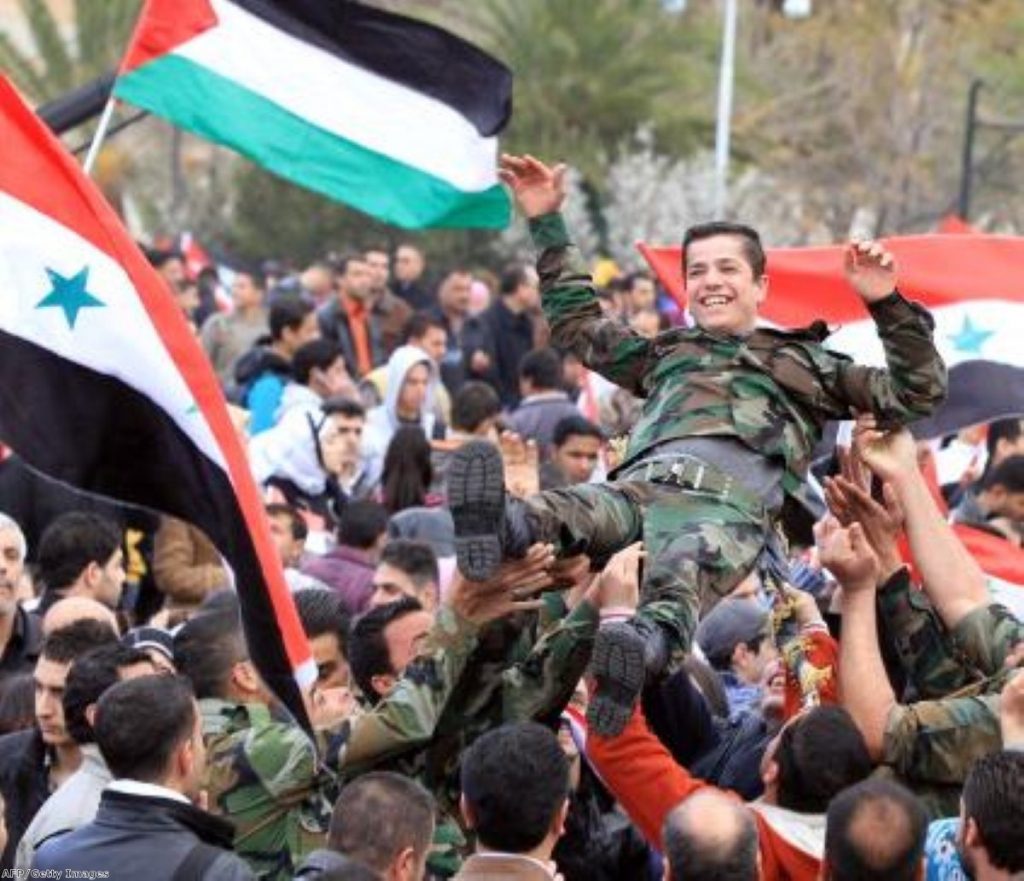Analysis: A revolution is taking place in Syria’s Palestinian camps
As the regime of Bashar al-Assad begins to lose its grip in Damascus, an important minority is being overlooked that might yet play a significant political role.
By Nagham Issa
There are no estimates as to how many Palestinians have been killed since the unrest in Syria began, but the growing call for the fall of the Syrian regime has not passed Syria's estimated 500,000 Palestinian community by. Increased tensions with the Syrian authorities could yet mark a change in direction for the revolution, particularly in the capital, home to Syria's largest Palestinian camp, Mukhyam Yarmouk.
Since the revolution began the Palestinian political elite in Syria have doggedly stuck by the regime's side. At the forefront have been Al Saiqa (the Palestinian Ba'athists) and the Palestinian Front for the Liberation of Palestine General Command (PFLP GC) that have actively taken roles in the intimidation and arrest of suspected pro democracy protestors. Led by men such as Ahmad Jabril, they have continually pushed the regime line that Assad is the protector of Palestine and that the Syrian regime is fighting an armed insurgence sponsored by Islamic Jihadists and Israeli-backed Western powers.


There have been some attempts by the camp to challenge their hold – most notably during last year's anniversary of the expulsion of the Palestinians from their homeland (the Naqba) – but the continued support of the regime by these Palestinian groups has only seen their patronage increase. The silence of Hamas, Islamic Jihad and opposition factions has also given little encouragement for other voices in the camps to speak out.
Yet against this political context, the community's living conditions have only worsened in recent months. As sanctions have played their role in crippling the Syrian economy, the price of daily food stores have risen sharply: the price of twelve eggs increased from 125 to 320 lira in the last month alone. Access to gas, electricity and mazoot (oil used for heating) have become extremely limited and even the state subsidised bread have been rationed to only two packs per day per customer.
Furthermore, the violence affecting the rest of the country has not left Palestinian communities unscathed. Last summer's naval attack on the coastal area in Lattakia saw Al Rammal camp devastated by the regime for harbouring "armed gangs". The camps in Deraa and Homs have come under routine under attack since the crisis began in March last year.
Only this week, a car bomb exploded on the Talateen road, on the edge of Yarmouk camp in Damascus, killing two Palestinian Liberation Army (PLA) officers and damaging property, according to young activists on the ground.
In response, opposition in the camps has been growing, particularly in Yarmouk. Protests outside mosques in the camp have begun in earnest. Groups on social media sites such as the Mukhyam Yamouk News on Facebook have now been set up to organise opposition activities. In recent months the 'Free People of Yarmouk' was created, a guerrilla group whose activities include posting notes under the doors of the camp calling for the end of the regime. "Assad's dogs are warned" was their ominous closing statement, after they'd laid out their agenda to stand with the Syrian people in their most recent poster.
This development has not gone unnoticed by the Palestinian political elites. In reaction, Maher Taher (PFLP) and other leaders of the PFLP GC have recently left for Gaza for
political "visits". Hamas and Khaled Mashaal have also left for outreach work in the region.
Their departure is a sign that the regime's grasp in the capital is weakening and public support for Assad is losing strength.
Unfortunately for the Palestinians the government has also begun to notice these developments and they have begun to act decisively to put down any rebellion. Not only does Yarmouk camp determine the mood of the majority of Syria's Palestinians, as one of Damascus's largest suburbs, it is also a key strategic area that borders two of Damascus's most active dissident hubs, al Midan and Hajar al Aswad. Armed soldiers and Mukhabarat (secret police) now regularly patrol Yarmouk's roads and some say the car bomb on the Talateen Road which happened at the weekend may have been a regime orchestrated warning against any further trouble.
However, as Syria's population continues to fight against the oppressive tactics of Assad's despotic regime, it could be that Syrian Palestinians will not remain quiescent. As the revolution gains momentum in the camps, it might not be long before we see another Damascene suburb fall and all Syrians one step further towards bringing about the end to the Assad regime.
Nagham Issa is an NGO worker who recently returned from Syria and who spent extensive time in Mukhyam Yarmouk, the main Palestinian camp in Damascus.
The opinions in politics.co.uk's Comment and Analysis section are those of the author and are no reflection of the views of the website or its owners.












